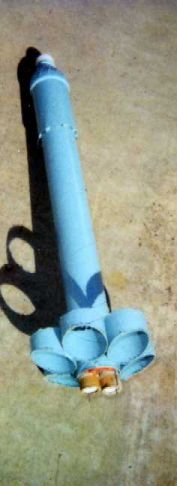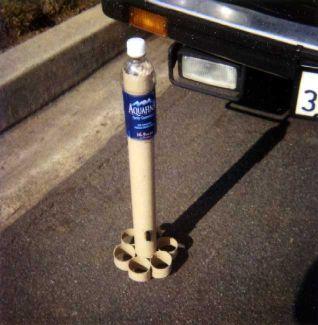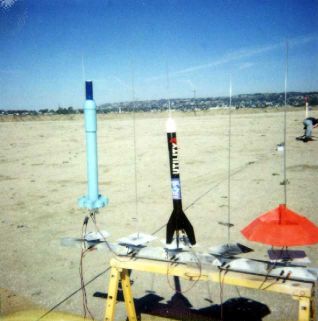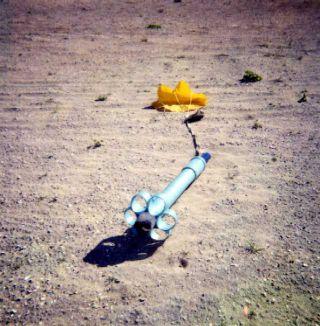Scratch Aquafina Original Design / Scratch Built
Scratch - Aquafina {Scratch}
Contributed by Larry Brand
| Manufacturer: | Scratch |
 Brief:
Brief:
Aquafina is a tube-fin 24mm cluster rocket utilizing a fixed nose cone with a
nose-mounted parachute mortar for recovery. The rocket was constructed at zero
cost from an empty gift wrapping paper tube and the upper half of a bottled
water ("Aquafina") PET plastic bottle. I wanted a good-flying yet
"expendable" airframe to use in experiments for igniting Aerotech AP
cluster motor arrays. Why a tube-fin design for this? -- they typically have CP
so far aft that CG is easier to balance properly when heavy motor systems are
used. Why a parachute mortar? Well, number one, this becomes necessary when
saving on cost by using an old plastic bottle for the nose cone, and number
two, I was interested in this deployment approach for another project I'm
working on: a full-scale, K445-powered model of a TOW 2B anti-tank missile
using the long "nose fuse" to contain and deploy a 70" chute on
the 5-foot long blunt-ended model.
Construction:
Construction of Aquafina began with cutting up the wrapping paper tube to
create an 18" body tube and six 1 1/2" tube fins cut on the bottom to
a 22.5 degree angle. Tube fins measure 1 1/8" on the short side.
Construction of the airframe follows that of
Cheap Dumb
Rocket and
Auracle
54 on this website. 5-minute epoxy was used throughout. The bottom 2"
was cut from the PET water bottle, and the resulting "nose cone" was
permanently attached to the body assembly; since the PET bottle chosen is
slightly wider than the cardboard tube,"shims" consisting of a dozen
Q-tips dipped in wet epoxy were inserted between the tube and the plastic
bottle around its entire circumference. To make complete a gas-tight seal, the
gaps between the Q-tips were filled with bits of epoxy-dipped cotton. A launch
lug of 3/16" ID was cut from a discarded ball point pen cap and epoxied to
the body tube 2 1/2" above the tube fins in line with one of the spaces
between the tube fins. The motor mount for the twin 24mm motors
 consists of
two 5" lengths of 24mm tube stock, fitted with Estes motor hooks and
blocks in the usual way, simply glued side-by-side. No centering rings are
used; the cluster motor array is simply slathered with epoxy and slipped into
the aft end of the body tube since the fit was pretty good. With all that
surface area bearing the sheer loads, there was no need for centering rings.
The substantial gaps left between the body tube and each side of the twin
cluster were plugged with hunks of cotton soaked with epoxy--this insured
proper ejection charge pressurization.
consists of
two 5" lengths of 24mm tube stock, fitted with Estes motor hooks and
blocks in the usual way, simply glued side-by-side. No centering rings are
used; the cluster motor array is simply slathered with epoxy and slipped into
the aft end of the body tube since the fit was pretty good. With all that
surface area bearing the sheer loads, there was no need for centering rings.
The substantial gaps left between the body tube and each side of the twin
cluster were plugged with hunks of cotton soaked with epoxy--this insured
proper ejection charge pressurization.
Finishing:
Painting was with aqua-colored spray paint.
Flight:
First flights were on a pair of D12-5 motors. Sims (at Cd=2.4) predicted an
apogee of 400-500' AGL and max velocity of about 170 mph. Aquafina flew at
least that high. D12-7's work equally well. Use of F21's should give at least
1000' per simulation. With all that drag, Aquafina pretty much just stops when
the motors quit. Boosts were straight and quick--probably quite a bit higher
and faster than the simulation indicated.

Recovery:
I attached a 24" length of 3/8" wide elastic shock cord to a 14"
LOC chute at one end and anchored the other end with a gob of epoxy about
2" down from the mouth to the inner wall of the PET bottle. The
"parachute mortar" consists of a 4" length of 29mm Estes tubing
epoxied to the top of the bottle, however, I added it as an afterthought--on
the first flights, I tried just stuffing the parachute part-way into the open
mouth of the bottle, however it wouldn't deploy this way, even under the power
of twin D12 ejection charges. From this, I learned that Aquafina is so light
for its size, and so tail heavy, that even with no ejection, it tumbles down
from apogee very slowly, in a flat spin, landing with no damage. I'd omit the
recovery system entirely, but for a rocket this size, it would be poor form,
and also a violation of NAR safety rules. And that's it...construction,
including painting, took little more than an hour, with time out to watch the
Chargers get creamed by Oakland. Final weight was 130 grams (about 4.5 oz.)--
not bad for a 2x24mm cluster design.

Summary:
Bottom line: Aquafina is a good cheap fun-fly rocket, low cost (need only to
purchase the recovery chute.
PROs: Aquafina is was way too much fun to fly to use only for "research purposes". Cost of construction (for me): $0.00. It's based on a standard-sixed PET bottle, which are easy to come across. Good rocket for junior flyers and cheapskates. Good rocket for learning cluster flying with minimal investment in time or dollars.
CON: Well, it is a tad ugly, like most tube-fin designs. You may have to scrounge to find suitable sized body tubes and PET bottled of slightly larger tube diameter.
Sponsored Ads
 |
 |











